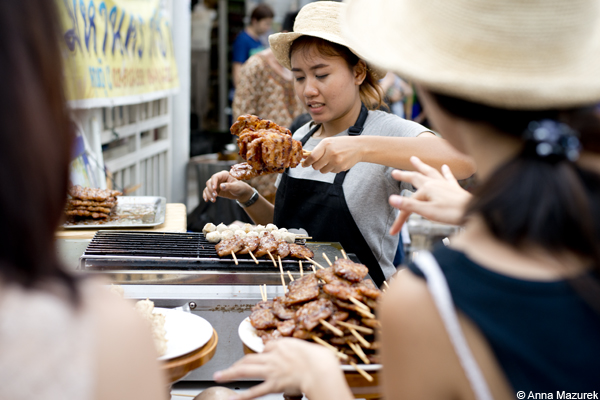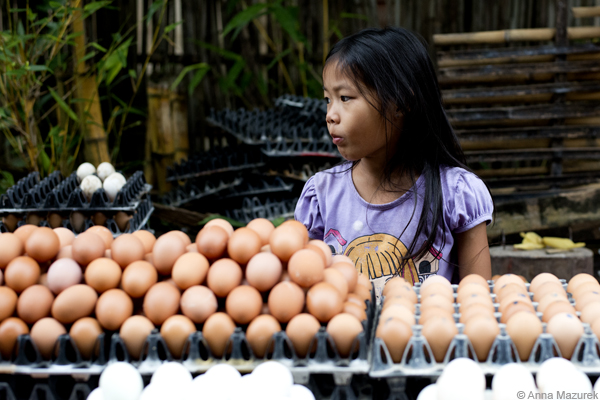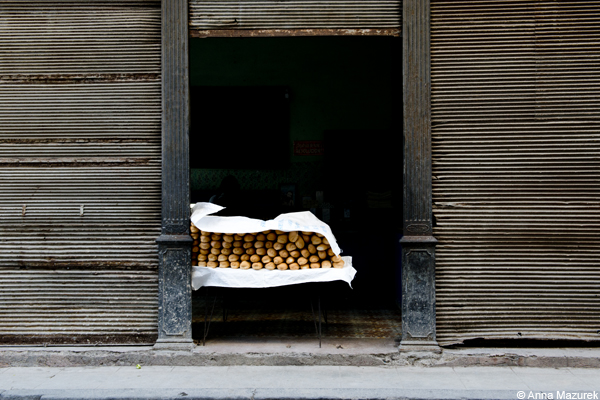
Left: Dragon fruit is cheap in street markets in Thailand. Right: Pumpkin soup at my favorite cafe in Laos – JOMA Bakery!
Food is my biggest expense. I will pay $4 for my accommodation and spend $15 on breakfast. I like to eat. Luckily, fresh, quality food can be significantly cheaper abroad because the produce is local and not shipped across the world.
Eat with the Locals
If a restaurant is full of foreigners, it’s not going to be cheap. Street food and local restaurants offer the best quality food at the cheapest prices. A meal at a street market in Thailand will only cost a couple dollars. You can get a street quesadilla for $1.50 in Mexico. Most local markets have a section of vendors serving prepared meals. Follow the crowds of locals. (Street food is pretty much safe. Be careful in India.) Ask your hostel or accommodation for suggestions of great places where they—not the tourists—eat.
Food Courts
All the big fancy malls in Bangkok have amazing food courts with delicious and cheap food stalls with dishes less than $2. Avoid the proper restaurants that surround the food court. Even ritzy Singapore has large hawker centers where you can get a meal for less than $5 and fresh juice for $1.50.

My favorite street food in Thailand are the chicken and pork skewers cooked with sweet coconut sauce. Only 30 cents each! For dinner, I’ll eat two of these and two bags of sticky rice. Grand total: $1
Skip the Soda
Drink water or fresh juice. It’s cheaper and healthier than a soda. Fresh squeezed juice is rough a $1/glass in Asia and Latin America.
Pack a Water Filter
Buy a water filter and filter you own instead of wasting money on plastic bottles, which are bad for the environment. I recommend Sawyer’s Mini Filter. It’s tiny, inexpensive and easy to use. I’ve been using it for the past four months in Central and South America. Also, invest in a good insulated reusable water bottle like Klean Kateen. Avoid anything that’s not BPA free or aluminum. Stainless is easy to clean and keeps beverages colder longer.
Both the water bottle and filter will save you a fortune in airports. In Mexico, bottled water was five times more expensive in the airport. I simply filtered the bathroom sink water.
Free Breakfast
Look for accommodation that includes free breakfast. Be sure to inquire about the type of free breakfast. I just emailed two hostels in Medellin, Colombia asking what they offer for breakfast. The one with the best breakfast gets my business. Check hostel reviews – if the breakfast is bad, it will be noted.

I love that you can buy eggs individually in street markets across the world. Morning market in Luang Prabang, Laos.
Cook
Most hostels have full kitchens. I cooked dinner every night for a week in Oaxaca, Mexico with some new friends from my hostel. We each spent $2/night on food at the local market. We had good quality and hearty meals filled with tons of local, fresh vegetables and even homemade tortillas from the street market. The best thing about traveling is that you can buy produce and eggs individually so it’s easy to buy exactly what you need!
Peanut Butter
Nothing will get you through long bus rides or early mornings like peanut butter. Food at train/bus stations is usually overpriced and horrible. It’s also notorious for food poisoning. Make a peanut butter sandwich for the road and treat yourself to a good dinner when you arrive. Buy a jar of natural peanut butter before you leave home at Trader Joes or Whole Foods for $3. (By natural, I mean unsalted and no artificial sweeteners.) Grab some local honey and bananas at the street market for a real treat. I’ll grab bread from a local bakery and make sandwiches on the train. Skip the ramen – it’s gross and bad for you.
Don’t Skimp on the Tip
Traveling on a budget isn’t an excuse to be cheap. Consider tipping in your budget when eating out. Guidebooks will give you a good idea of what is appropriate for local customs in restaurants versus taxis etc. Bartending and waiting tables funded a great deal of my travels. Tipping is heavily relied on for survival in many parts of the world especially when non-democratic governments are involved.


